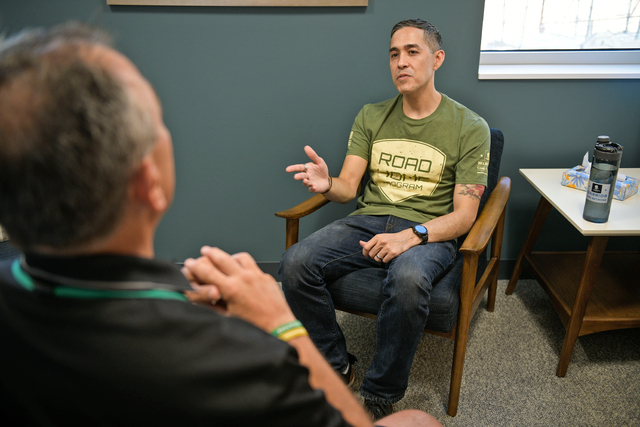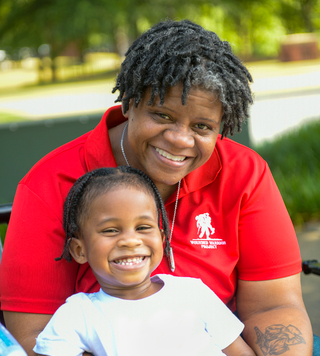Warrior Care Network Brings Light and New Life to Veterans

Sergio Alfaro sat in the middle of a test at Harvard Medical School, but all he could think about were traumatic events that happened in Iraq.
After serving as a medic in Iraq, Sergio followed up his Army and Air Force National Guard career by graduating with honors from UC Riverside and gaining entrance into Harvard Medical School.
It was a dream he had nurtured for a long time. Then, post-traumatic stress disorder (PTSD) unraveled his personal and professional life.
“I couldn’t see past the memories,” Sergio recalled. “I couldn’t see past the feelings. I couldn’t pull up the information that I had worked so hard to learn.”
He was also growing distant from his wife, his family, and friends. He thought he needed to “pull the plug” from his emotions to be able to function, but he only became isolated.
“I saw that the more I tried to cut off my emotions, the more I actually drove people away, and the more people just did not want to be around me or talk to me,” Sergio said. “The people who loved me had left me because they honestly believed that I had become my PTSD and that the person I used to be was gone.”
He ended up withdrawing from med school and feeling he had little to live for after losing his long-term career goal and alienating his loved ones. He contemplated suicide.
Fortunately, in attempting to find help to save his marriage, he found an opportunity to receive veteran PTSD treatment via Wounded Warrior Project® (WWP). The nonprofit’s Warrior Care Network® is an outpatient treatment program that makes world-class care at four academic medical centers accessible to warriors at no cost to them.
A Life-Changing Program
Through two-week intensive outpatient programs, Warrior Care Network provides care tailored to each veteran and family member. It integrates behavioral health care, rehabilitative medicine, wellness, nutrition, mindfulness training, and family support.
“One of the unique strengths of Warrior Care Network is that it’s tailor-made for the individual that it’s serving,” said Erin Fletcher, Psy.D., WWP’s Warrior Care Network director. “While we know the symptoms of PTSD are very similar across the individuals who experience those symptoms, we also know what doesn’t work is a cookie-cutter approach to this care.”
Warrior Care Network provides clinical care along with wraparound support to ensure each veteran is getting the best treatment.
“We know that targeting one aspect can provide you with some relief, but we know that what brings the most results is taking a comprehensive, individualized approach to care, and that’s what you would get at Warrior Care Network,” Erin said.
The completion rate for those participating in Warrior Care Network is greater than 90%. “Individuals who come in and put in the work – they get better – and they get better through facing that trauma, and they’re not facing it alone.”
A Family Affair
For warrior Yolanda Poullard, family was a focus and a motivation for trying Warrior Care Network. After retiring from the Army, Yolanda tried several programs to address her PTSD. She credits the time she spent at Operation Mend, UCLA Health’s Warrior Care Network program, with changing her life.
“The treatment from Warrior Care Network brought the light back into my family and into my household, and it gave me the strength, the energy, to want to live again, because without Warrior Care Network, I wouldn’t be here today,” Yolanda said.
“I was still waking up in the morning like I was going on a mission, looking for my gear,” Yolanda recalled. She had trouble being in a crowd and her anxiety made her unable to attend her daughter’s recitals and other school-related activities.
“I was in this black tunnel, looking and struggling for light and, after Warrior Care Network, they helped me find my light,” Yolanda said. “Wounded Warrior Project came around, they gave me the tools, the skills, and resources to live again. And I’m very grateful to Wounded Warrior Project for that.”
Getting It All Out
Air Force veteran Sam Hargrove found other WWP support programs helped in preparing to make the most of her time at the Veterans Program at Emory Healthcare, part of Warrior Care Network.

“I was in a stage where I didn’t know where I was going to be one day to the next,” Sam said. “So, mentally I was able to let myself go on that first day [at Warrior Care Network] and do it for me, because I got a whole family. My family needs me and not a person who’s not really there.”
While VA had helped Sam through a crisis period, her long-term mental health continued to be a challenge. Despite inner turmoil, Sam knew there were options for her, and she knew her love for her nieces, nephews, and new stepchildren was stronger than her PTSD.
When Sam felt she was on the right path, she sought the next step in her healing journey through Warrior Care Network.
“I jumped right in — I was ready to rip the Band-Aid off. It was like my pop telling me what I needed to hear. So, even though at first I wasn’t sure I wanted to be there, I opened up. As you tell your story, more parts come back. It puts you in an uncomfortable spot, and you have to be willing to feel uncomfortable to get to where you want to be. I was shocked that I was able to do it.”
Sam dug deep and found ways to build bridges between herself and others. “It was an intense moment. I finally got it all out when I did Warrior Care Network, so that’s why I’m such an advocate for Wounded Warrior Project. I would have never gone to that program without Wounded Warrior Project. I would never have been able to tap into exactly what the issue was.”
Sam describes herself as “calmer and more problem-solving” now.
“I know I have PTSD, but I also know that I have a support system like Wounded Warrior Project, my partner Onishka, our kids, and grandkids,” Sam said. “When I sit back and think about the things I’ve been through, I think, ‘What can I do to help somebody else get to where I am?’”
Connecting to Others and Sharing Lessons
Sergio appreciated the whole-person approach Warrior Care Network offers – and the fact that his wife Christina was able to participate as well.
“They recognize this doesn’t just affect the veteran, it affects the family,” Sergio said. “They brought in my wife, Christina, during the second week of the program and she learned so much about PTSD. She even recognizes when I start cycling on negative thoughts, and she’s able to help me anticipate more and help me through the panic attacks. She’s become a part of my team.”
With a renewed sense of worth and pride, Sergio has found a new purpose — helping other warriors by sharing his experience and leading them through their own struggles.
“In medical school, they say you don’t really learn something until you can teach it to others,” he said. “So, helping my fellow warriors is really another step in treatment. By teaching others how Wounded Warrior Project has helped me learn to live with PTSD, I’m building upon my own recovery.”
Read recent news from Warrior Care Network. Learn more about how veterans can register and request assistance via Warrior Care Network.
Contact: Raquel Rivas — Public Relations, rrivas@woundedwarriorproject.org, 904.426.9783
About Wounded Warrior Project
Since 2003, Wounded Warrior Project® (WWP) has been meeting the growing needs of warriors, their families, and caregivers — helping them achieve their highest ambition. Learn more.